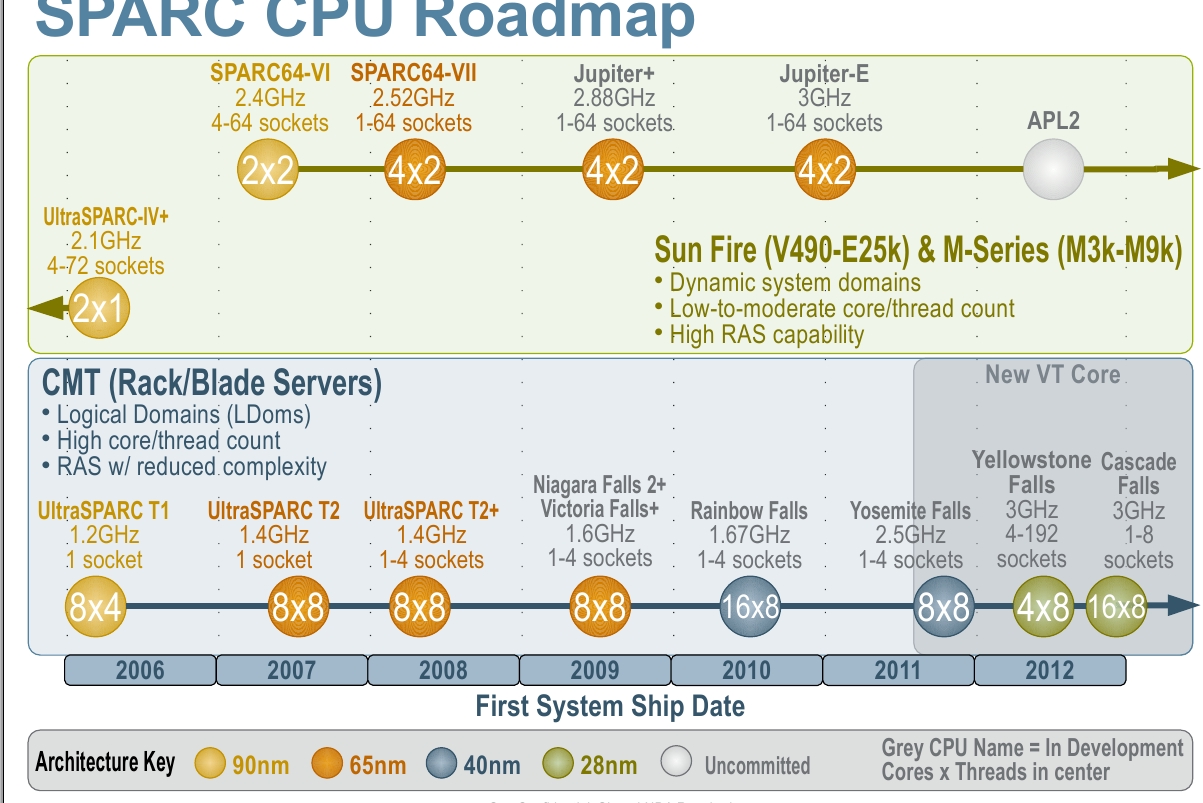This article is more than 1 year old
Sun's Sparc server roadmap revealed
Well, what's left of it
Exclusive For those of us on the outside of Sun Microsystems, the future of the Sparc processor and its related server platforms has been the subject of much speculation and debate. But for Sun's largest customers, the mystery has been over since sometime in June.
That's when Sun's execs made the rounds to the biggest Sparc shops in the world and gave them a preview of the Sparc roadmap over the next three years. Under non-disclosure, of course. Like that was going to hold, considering all of the curiosity in the wake of Oracle's pending $7.4bn (net around $5.2bn) acquisition of Sun.
El Reg has obtained the one-page roadmap that Sun's customers - and presumably also Fujitsu's customers - have been shown about the future Sparc processor lineup. As we originally reported in mid-June, the 16-core "Rock" UltraSparc-RK processor for Sun's once-and-never "Supernova" line of servers is not on the roadmap.
Sun has never confirmed rumors that Rock was dead, which we heard second-hand from people who heard it from Sun sources who know. Then in early August, the tweaks for the Rock chips were removed from the OpenSolaris development version of the Solaris Unix variant, which referred to Rock as the UltraSparc-AT10. Call it what you will, but most Sun watchers think Rock is dead, even if Sun isn't (officially) talking.
The roadmap above is by no means the ultimate roadmap that Oracle will use to pilot the Sun server business once it has acquired the company, which it almost surely will because no one else wants Sun, at least not in its entirety. And despite all of its bravado about taking on IBM in the server business in recent weeks (see here and here), it would be hard to find anyone in the IT business who wasn't skeptical about Oracle's long-term commitment to being in the relatively low margin server biz, especially since it not only apparently tried to sell off Sun's server biz to Hewlett-Packard before launching its acquisition, but also tried to sell it off since the proposed takeover was announced in April. Oracle has not confirmed any of this, of course.
Let's get back to the roadmap (below), starting on top because it is easier. We can expect a goosed Sparc64-VII+ chip any day now, which will run at 2.88 GHz and which will be a four-core, eight-threaded chip like its "Jupiter" predecessor. This Jupiter+ chip is implemented in the same 65 nanometer process as the Jupiter chip was, and it is made by Fujitsu, a company that is in the process of outsourcing its chip manufacturing to Taiwan Semiconductor Manufacturing Corp. A long way off in late 2010 or early 2011, the Sparc Enterprise server lineup gets a speed boost to 3 GHz with the Jupiter-E chips.
After that, in 2012, Sun has made no commitment to the kicker line of Fujitsu "Advanced Product Line 2" servers coming from Fujitsu. These APL2 machines are presumably to be based on the "Venus" eight-core Sparc64-VIII processor, which has a Sparc64-VIIIfx variant aimed at supercomputers. That Sparc64-VIIIfx chip will be used in a 10 petaflops massively parallel machine being built by Fujitsu and paid for by the Japanese government under the 1.2bn Project Keisoku effort.
(This project originally called for the three key server makers in Japan - NEC, Hitachi, and Fujitsu - to cooperate in building a 10-petaflop machine made up of scalar processors designed by Fujitsu, vector processors designed by NEC and Hitachi, and a system design created by all three. Earlier this year, NEC and Hitachi pulled out and in July, Fujitsu took over the whole contract).
There's no 16-core, 2.1 GHz UltraSparc-RK chip here. No box that is going to offer 30 times more oomph on "data throughput" workloads compared to systems using 1.2 GHz UltraSparc-III processors, as Sun was promising back in 2005 through 2007. And with Oracle being a big Sun shop itself, it would be funny to learn if Oracle's own IT shop is a bit miffed at Sun and Fujitsu at this point, after many product delays and now, the death of Rock.

